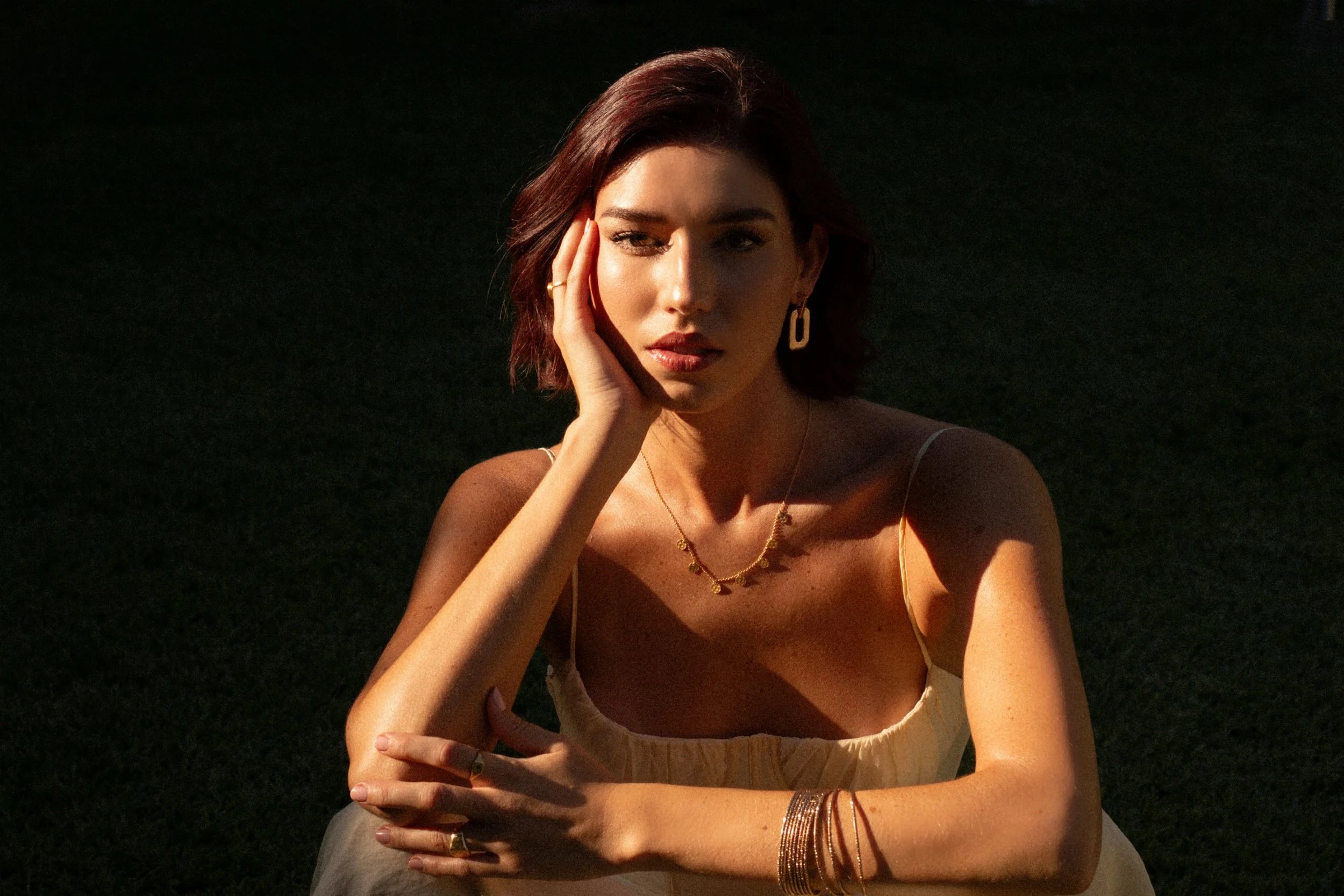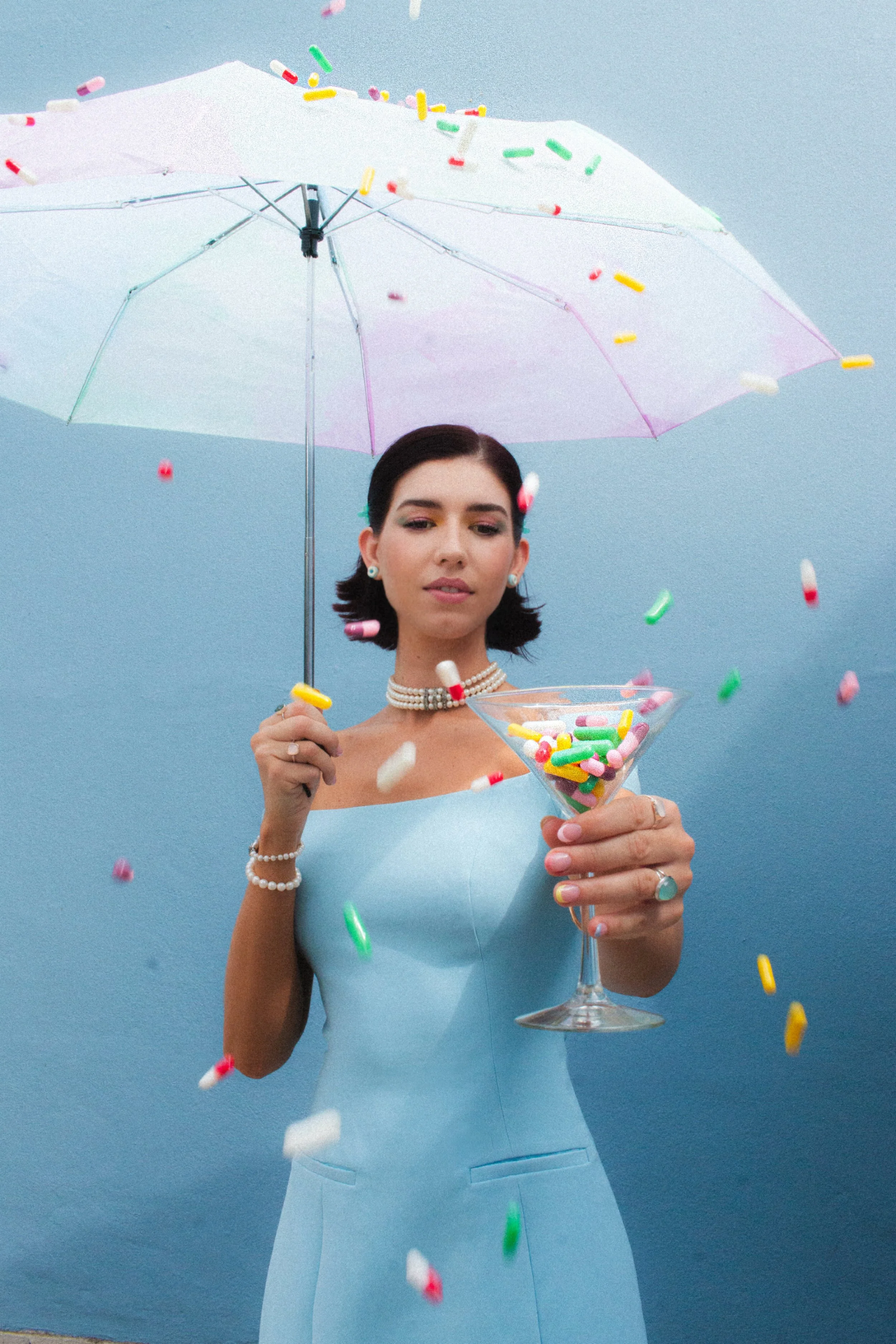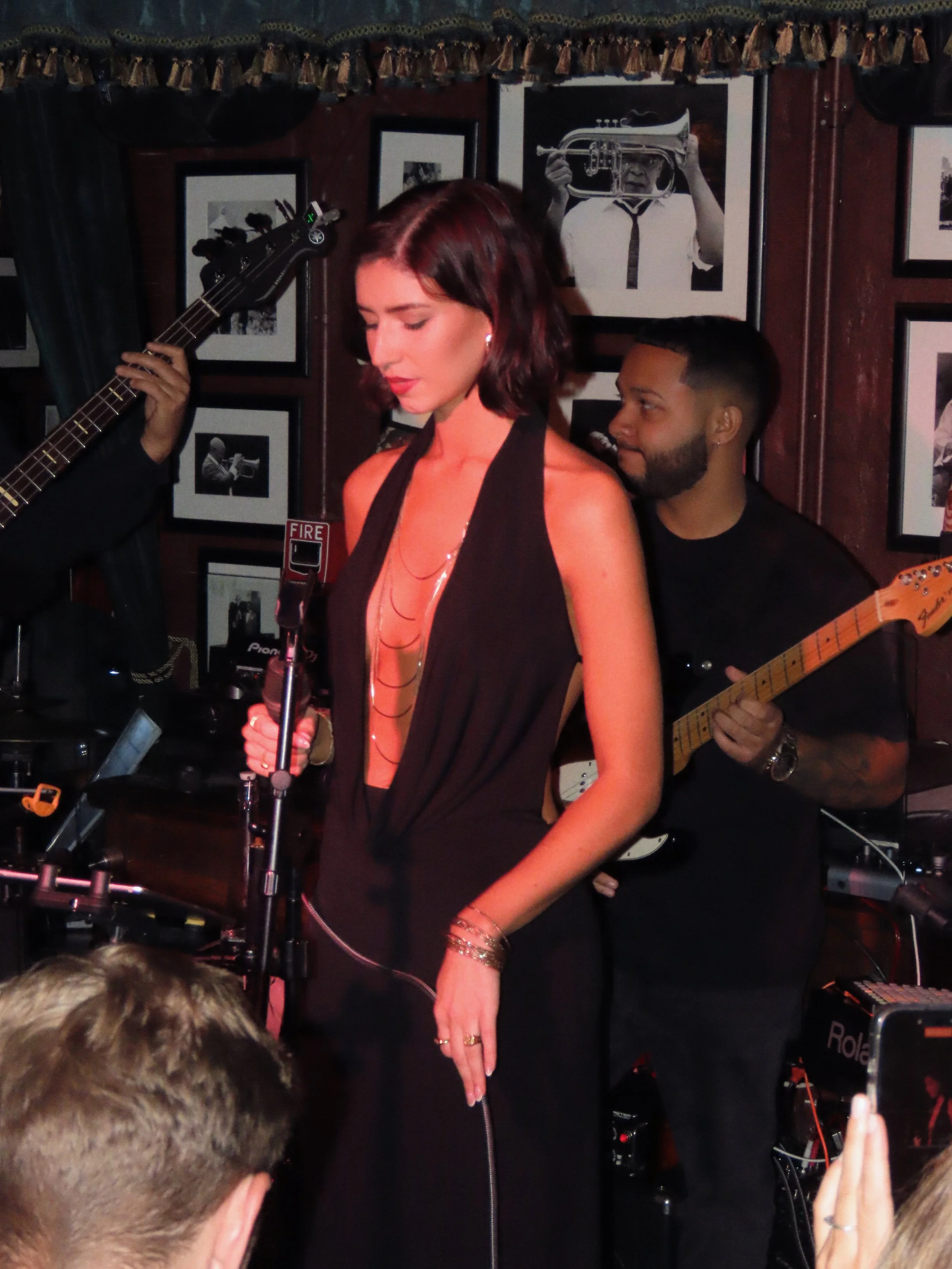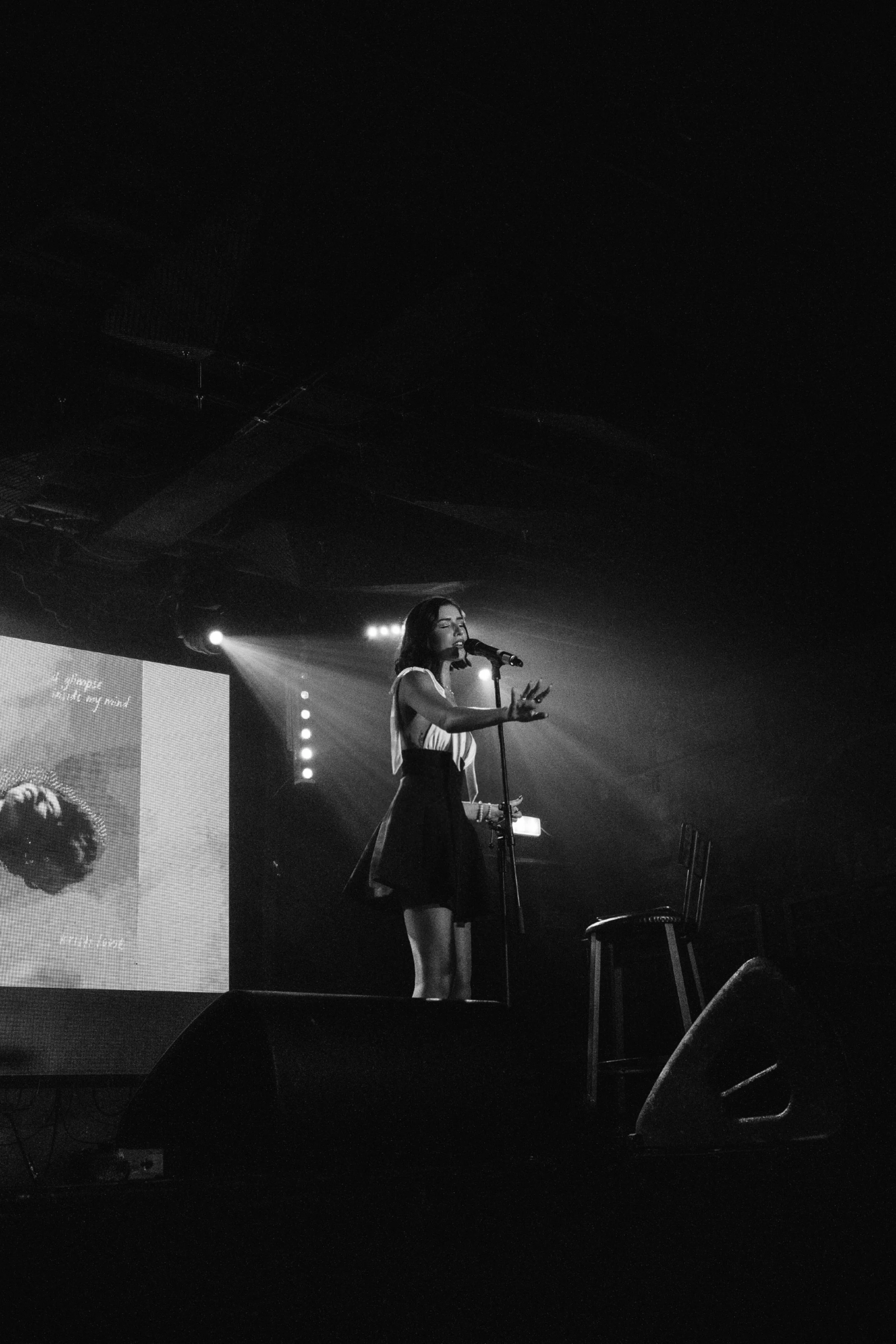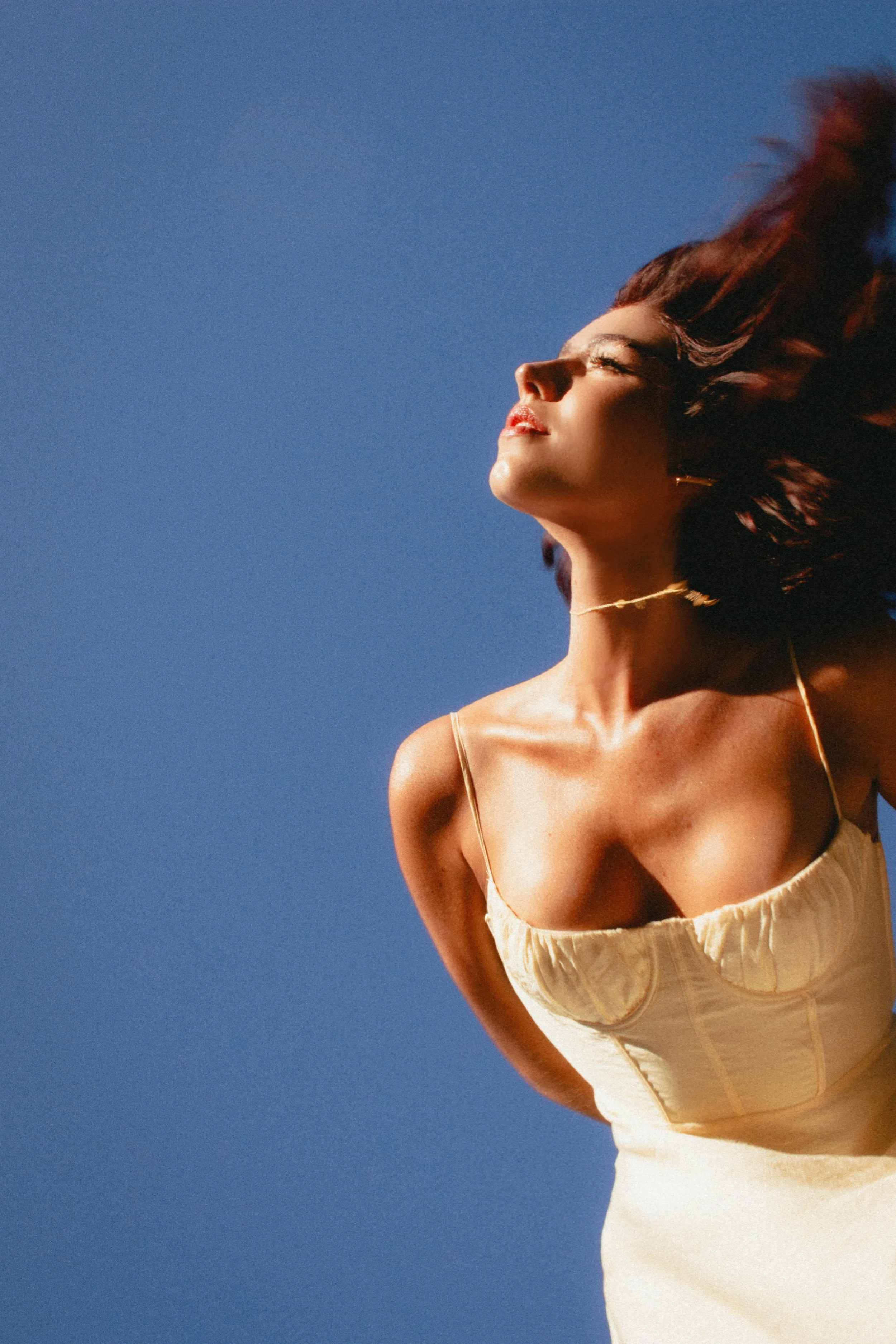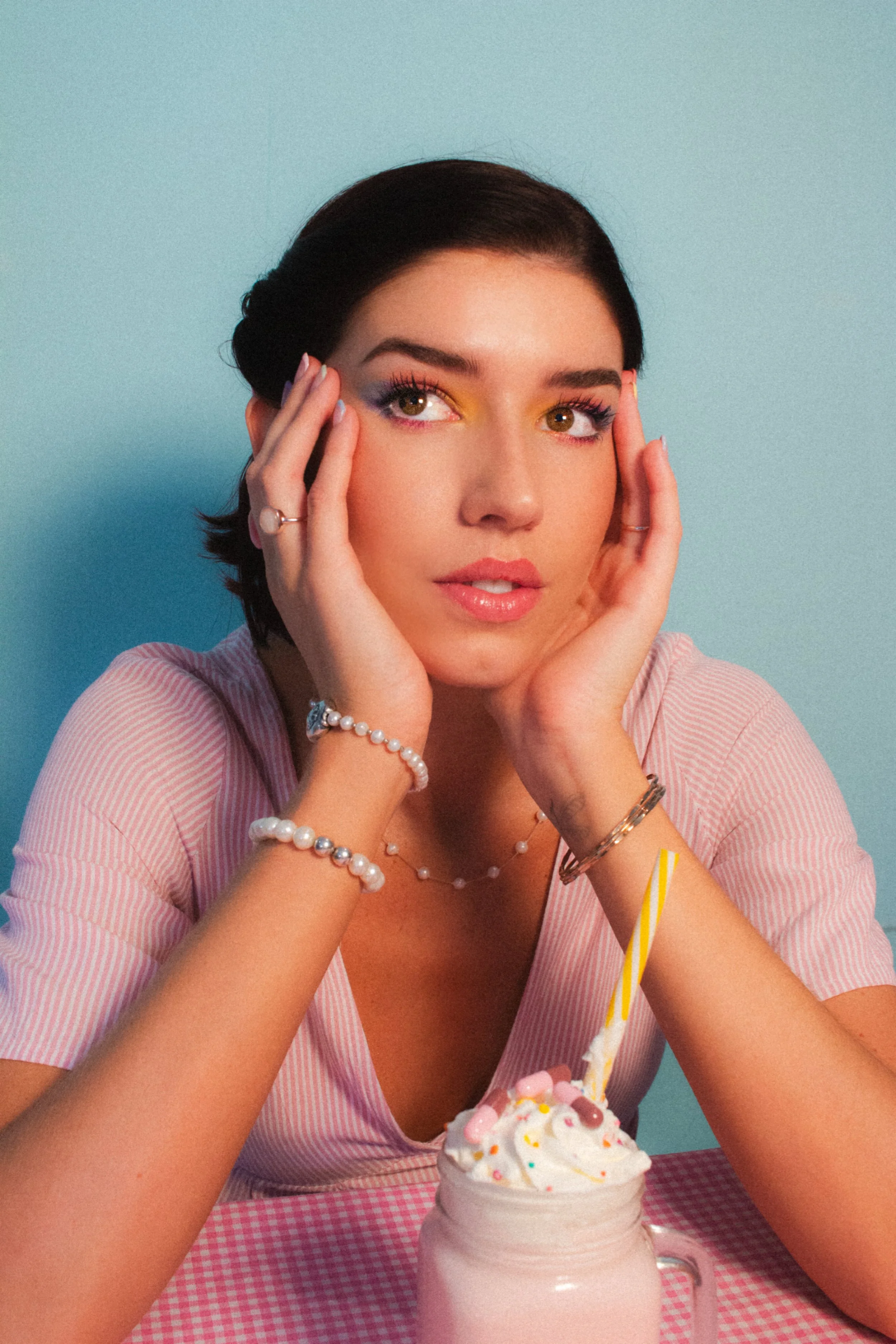A Glimpse Inside Kristi Lowe’s Mind
To be honest with you, I was kinda unprepared for this one. Sure, Kristi Lowe had come across my radar before in my ever expanding search for local music, but outside of that I had virtually no context as to Kristi’s story - blame my until recent naivete about the local scene.
But therein lies the beauty in what we do - the art conversation. Not long after the interview was scheduled, The Daily Maverick published an article written by Kristi which immediately piqued my interest. Coupled with a surprisingly in-depth podcast interview with the gents from The Gen C Podcast, I was itching to get a glimpse inside the mind of one of the humblest local artists I have met.
Photograph by Luc Maingard
Tell us your story - from your first single released in 2020, what has been the story of your artistry leading up to your debut album release?
You might have heard a little bit of the story of why I got into music, which was mostly due to my sister's story and her diagnosis. My music career started on the back of her campaign - writing the soundtrack to her plea for sign-ups for organ donors.
I had started voice lessons in junior school, probably from around the age of 10 or 11, and I always had a passion for music. I'd never really considered it as a career path - I mean, I was 10, I wasn’t really thinking about a career. At the age of 13, I did my first school showcase, and I was like, “Whoa, this is quite nice. I like being on stage”. That was when Matt Pearce, who's a family friend, first heard me perform, and e came up with the idea of writing a song for Jenna’s campaign. We collaborated with GoodLuck and produced the single - but the reason I don't really consider it my first song is because Jenna wrote the lyrics, Good Luck wrote the music, and I just sang it. So it's my voice, but it's not my writing - they aren’t my words.
I was lucky in that I was able to step back from the spotlight, because my exposure to the world was through the campaign. So when my sister passed, I was given the time to figure out for myself what I wanted, and if music was what I wanted to do.
I started my career very backwards. I mean, one of my first performances was Newlands Stadium in front of 40,000 people when I was 15! Only to stop performing completely and start up again at 20 years old. So getting back into things, I really had to rediscover who I was and who I wanted to be in music in the first place. My goalposts were so skewed by my experience earlier on that I really had to reset my expectations and build my career from the ground up again.
What was that like - starting over? How did you find your voice after performing at that level to that many people?
It's taken me a while. I'd say it's taken me till now, until this album, to feel like I really have found who I am as a musician and as an artist - my writing style, my sound. I think the interesting thing about a music career and being an artist is that it's so inextricably linked to who you are as a person. And with everything I've been through, with losing my sister and recently losing my dad, that journey was very intertwined with my healing, my grief, and figuring out who I am and how to survive without them.
So my journey as an artist was linked to me figuring out who I was going to be in the world. With situations like these, there are always things that you would have done differentlyif you had the chance. But I think I wasn't ready before now to do what I've done with this project. I didn't know who I was.
I think if you go back and listen to my discography, you can hear that. It's a bit all over the place. I was still figuring out what kind of music I wanted to make and what I even liked.
What kind of music do you like?
I've always loved pop - I have very fun memories of listening to all the NOW CDs and the back of the car with my sister. But also big roots in jazz and soul - that's kind of where I started out. I was trained by Kim Kallie , a vocal coach here in Cape Town, we started with classical and jazz training and then kind of ventured over into pop.
I think it's also a journey of self discovery that a lot of artists have to come to terms with. “What do I want?” versus what I'm told I should want by the industry, you know? And I think there was a bit of that when I first started. I was like, “I want to be a pop star”.
It took me about a year and a half, two years to figure out that that's actually not at all what I wanted. I want to be a musician who writes about subjects that she cares about and connects with people. I want to build my career off of authenticity and music that I love, and find people that love it too - and not write music with the intention of making a hit single. Not that I'd say no to a number one hit.
So given that those are your influences, how would you then describe your sound?
So I think that's the interesting thing - we made a decision when we started this album to not be defined by a genre. We went into the studio, and we threw out all the rule books. We’re bored of trying to make music that fits into a box. Let's just make music that we love, that we think sounds great and then, people can figure out where it fits in after that. I think our intention was never to write hit singles for radio. It was to write music that both myself and Blake, the producer and co-writer on the album, could sit back and be like, “we love this. This is something I'm proud of putting out into the world”. And it'll find its own place.
The album cover for Kristi’s debut album, ‘A Glimpse In My Mind’ by
I fully agree, the convention of genre does become harder to stick to these days. In that case, how else would you describe your sound? Using colour, or feeling, or time of day, or anything really?
If it’s a time of day, I would definitely say sunset. It gives me a very calm, relaxed, introspective vibe. Like sitting on your own, thinking on things. So time of day, sunset, and those are the colours you can see on the album cover as well. It's all sunset colours: deep blues and purples, oranges, and some yellow.
Yeah, I wanted it to feel warm and welcoming and relatable and comfortable for people. It's very personal to me - the reason I write music is to connect with people. I want people to be able to find a bit of themselves, their own story, and what I write about. So I think it feels like a sunset.
As we were planning this interview I came across an article that you recently wrote for The Daily Maverick, and to be honest I was surprised - I even asked Ntsika “what doesn’t she do?” Can you tell me how that came about?
I've always loved writing of all kinds. I did a degree at UCT in philosophy, gender studies, and Anthropology. I wanted to expand my understanding of people. I think in these last five years of discovering who I am, one of the things I had to really challenge myself to do was find my own voice and not be scared to share it. And along with this album, this was me really challenging myself to do that. I've always been scared of saying the wrong thing and I think it's hard as an artist because you always want people to like you.
I saw this quote the other day. I can't remember who said it, but it was along the lines of “if you want to be liked by everyone, that's all you're ever going to be - just liked by everyone. But if you want to be loved, if you want to have people that really connect with your music and be loved, then you also have to be okay with somebody hating you, because the only way for people to feel the one is for you to evoke something passionate enough for them to feel the other” And I sat with that for a while. I asked myself, ‘What am I doing? Why do I care so much what people say about the things that I know I care about and that I'm happy to stand for?’
Image sourced from Instagram// @kristi_lowe
So I've had this in the back of my mind, and I’ve been reflecting on my experience in the music industry and chatting to other women in the music industry. When I went over to London recently, that was the first time when I was like, 'Oh my gosh, like, we are so behind. ’ This is leagues ahead of where we are as a country, but particularly in Cape Town. I mean, Joburg is a little bit better off as they've got one or two female-led festivals, but even so, women are not represented on festival lineups across the country as much as they should be
So coming back from the UK, where I attended festivals with all-female line-ups selling to tens or hundreds of thousands of people, I was looking around, and I was like, "This is insane. I've never seen anything like this before". When I came back, I was chatting to a couple of peers in the industry, and I decided that I wanted to kind of put myself and my voice behind something that I am really passionate about.
I was very careful in my writing not to make it a victim mentality mindset. It's not “woe is me, people don't pay us enough attention” - that's not the point. The point is to start a conversation and get a whole lot of different perspectives, until it starts to shift something, you know? I think part of the problem is not enough visibility, and if people aren't speaking up about it, it just stays how it is.
Outside of the music that you listen to, what would you say influences your music and the way you write music?
Outside of the music I listen to… I think definitely the people I spend time with in my life. I mean, I find that amongst friends and family, the conversations we have, we've been through a lot as a family, and we've held a lot of space for these conversations that are challenging and difficult. I try to expose myself to different circles and different people and make sure that I'm not having a one-sided view of the world.
So I really let the people around me influence me as much as possible, and the things I want to write about. Definitely the things I've been through. I think any artist is the same. I mean, you can't separate out your lived experience from who you are. And I think that’ll always be a big part of what I write about.
It's interesting for me, because I was very shut down for a very long time after losing my sister. I went into quite a heavy depression for two or three years, and I wasn’t taking inspiration from much. So rediscovering my ability to be inspired and take influence from things has been part of this journey over the last couple of years.
How do I find things in the world around me that make me excited? Not only to be alive, but to create and to write? And it's a self-improvement journey that I’m still on, you know. But I think it's an interesting one because I see it in the artists around me, and I'm still trying to connect that part of myself. I think it was killed off for a while. But I'm slowly getting back to it, which is exciting.
I also think it's why artists and creatives so often work in phases. Creativity is not an output-based thing. You can't consistently create. You have to be able to take a step back and allow yourself time to recoup and be inspired to allow things to ignite that flame again.
This world is not conducive to creativity at all. The world that we live in makes it super, super hard to create. But I think it's also the exact antidote - it is what we need in society. We need more creativity. We need more people willing to have an outlet in creating and making art. So I feel very lucky that I've been able to make this into a career, as hard as it is and as hard as it can be. But God, if I had to sit in an office 9 to five, I don't think I'd manage.
Photograph by Luc Maingard
In the Gen C podcast you said something along those lines. “The 9 to 5 is how we survive but art is why we survive.”
I truly believe that creating art is the ‘why’, but we still have to earn a living. That was something I was so shocked about in London. I had to find a couple of musicians to work with there for my shows, and I honestly thought, “Is this going to bankrupt me?” Because they actually get paid a living wage.
For example, one musician for one performance earned the same amount as my whole band earns for one show here - and that’s split between 6 people. I know there’s the exchange rate and it’s a stronger currency and all, and of course, there are a lot of other factors, but if you chat to the musicians that side and ask “what do you do?”. They say music. That's it. Full-time. And I don't think I've ever heard anyone in South Africa saying that. I'm one of the very few that does music full-time. And even then, the only reason I can is because I also do corporate gigs and weddings. So I'm technically still not doing my own music full time. That being said, I am very hopeful that there will be a time when we don't have to do five or six other things to pay the bills.
Tell me more about your writing. Outside of music, do you write? Do you have a journal with thoughts and essays?
Yes, massively. Lots of them. I don't know, Writing, even before music, was always an outlet for me. I remember in junior school, creative writing was my favourite subject. I feel like all creative students always love their English teachers. I was just obsessed with my English teacher. I would do extra credit for creative writing - I'm such a nerd. And that was the start of something for me. I really had a massive creative outlet in writing.
My sister was older than me, by two and a half years, and she was one of the smartest people I've ever met - really wise beyond her years. I think because she was such a great writer and had the label of ‘the academic one’ and the ‘star student’, I kind of took myself out of the running for that in the family. I was left to my own devices in a way.
So my writing kind of became a personal outlet for me, rather than something that I did in the public eye. But it was something that I did for me, and then it became a way to express myself publicly - but also a way to stand for something. I think that's the power of writing for me - the efficacy with which you can deliver or communicate a message. I think writing is one of the most incredible ways to kind of get something across to people.
So then which aspect of your artistry do you favour more - the writing or the performance?
If you'd asked me before this album, I would have said performance. I think because, as I said, I hadn't really discovered my writing style yet. This project is the first time you couldn’t get me out of my studio. I was so engrossed in it.
At this point, they've kind of come on par with each other. I still love being on stage. I love performing, and I think that's where music really comes to life, in a live environment. You can listen to the recording until you're blue in the face, but it just never has the same impact and energy.
I think also as a writer, you're so alone in the creative process - which is great. That's where you need to be in order to do the writing. But where it comes alive for me is when I can see other people's reaction to it and see that it's landing and hitting home. Hearing their interpretations of the music is amazing.
I mean, it's my favourite thing that people come up to me afterwards and say like, “this brought up this and that for me” or “I love this song because…”. I think one of my favourite things about this album is that no one has the same favourite song. Everyone I talk to has a different answer every time, for a different reason. And that's what I wanted when I was writing it. I didn't want it to be one-cut-fits-all. I wanted to write what had meaning for me, but was up to interpretation for others.
Photograph by Luc Maingard
So before you found your voice with this album, what was the writing process like for you? Was it challenging?
I think it was challenging in that I was way too invested in what I wanted the final product to sound like, rather than just writing for the sake of writing and allowing myself to feel the things that I needed to feel in order to get that across to and into the music, you know? So I think if you listen - or when I listen - to my past music, you can hear the detachment. The lyrics aren't not true, though. I'm writing about stuff that I care about and that means something to me, but I don't think I was feeling it properly.
I think with this album, something changed. I’ve grown up a bit, I’ve done a lot of therapy, and for the first time, I’m really in touch with myself and really invested in doing the work to get better. And on top of that, I’ve found a sound and a writing style that I was really passionate about. And I think I kind of got lost in that for the first time, and it comes through. I can hear a difference when I listen to this album versus my past stuff. I can hear when I'm in it, you know? There were a few moments in the other songs, but I wasn't in it.
You’ve recently been promoting your Spotify Playlist, WeAreWomenZA - can you tell us about that?
After writing the article, I was kind of sitting with it, and I was like, okay, cool. I've now put my opinion out, and I've done the research, and I've put this out into the world. What am I going to do about it? Because I'm sitting here saying that something needs to change. How am I going to help change it, you know?
It’s one thing to have that conversation and put my voice to a cause that I'm passionate about and want to help change. It’s another thing completely to help platform other women in the industry. So I kind of went on a deep dive. I looked at everyone I could find - and I still am, there are so many incredibly talented South African artists. I went through recommendations from friends, I went based off recommendations from the algorithm, and I started building quite a comprehensive playlist - a cross-section, really - of South African female talent.
It felt a bit random to just chuck it all into a playlist. So I sat with it for quite a while and tried to kind of curate it into a set list, so that it feels like the energy kind of flows. I personally loved it, I must say.
Who is your favourite artist off your playlist? Or who has stood out to you?
Difficult question. The one I was grabbed the most by - and I had never heard of her before- Her name is Tessi Nandi. I heard her song, ‘Time as a Thief’, and I was like, this is just incredible. She's young, but her voice and the way she writes is just so powerful, I was sucked in immediately… So I think she was the one that I walked away with, kind of in the front of my mind, being like, wow, I want to hear more from her. And also as someone that I'd love to write with. I immediately reached out to her.
It's hard to pick a top three because there are so many incredibly talented people. Hannah Ray is doing really beautiful stuff as well. You can kinda see the type of music that I like to listen to. I love Mila Smith's music and her writing style. I think she's spunky and full of energy and amazing on stage, but also just a great songwriter. And then a new artist that has just recently released her first two singles is Sophia Frank. She has amazing stage presence. I don't know if you've seen her live. You know when someone just has a star quality? You're like, okay, this is gonna go somewhere… Teagan's amazing. I love her writing…There are so many! I can't actually choose.
But it's amazing. I feel like it's the first time that I've really made an effort to integrate myself into that kind of space in the industry and reach out to people. It's hard, but the reception has been amazing. I mean, these women are all such incredibly talented writers and musicians, but we’re also all in the same boat? And I think that's the main thing, realising that there’s nothing to be scared of in reaching out, because all you're doing is making a connection, and all you can do is help each other.
Now we get to the VERVE Question - what is your opinion of the current cultural landscape of the city, and where do you see it going from here?
That's a hard question. I think we are at a bit of a tipping point where people are waking up to the fact that nothing's going to change if people don't change it themselves.
It’s a criticism (both politically and otherwise) that I've seen come up in a lot of the media that I'm reading, about how South Africa has become quite passive in the way that we respond to challenges that we are faced with. In the way that we consume media, in the way that we are in the world. We kind of sit back and let stuff happen to us rather than stepping up and doing stuff for ourselves or changing things that we want to see a change in.
I think ever so slightly that people are starting to wake up to that, and I'm hopeful that in the next couple of years, it'll become more of a talking point - that actually nothing is going to change if you don't decide to change it yourself. And the responsibility is on all of us individually to make our community better, to give a hand up to the people that need it, to put a spotlight on people who aren't getting it and deserve it, to help your neighbour, help your friend, help your family.
I think we've always had a sense of community in South Africa, and I think that's an incredible thing. But I think we've gotten lost in it. And I think community is built on individuals putting in an effort to make the whole better. You can't lean on your community if you're not contributing to it. And I think that's the thing that I want to see change in the way that we are as South Africans, especially in the cultural setting. Just taking a little bit of responsibility for the role that we play in making both our lives and the lives of others better, and how we can put in an effort to make that happen.
It’s amazing how time and time again we meet artists who are so aligned with what we do here at VERVE Magazine. Maybe its because we have woken up to our responsibility in contributing to the independent aritst community, but the chakra hun in me would attest it to attracting the right energies and finding people on the same wavelength as we are.
This conversation fully engrossed me, and Kristi’s depth truly shines through in her debut album. Please give it a listen at your earliest convenience - as she mentioned, there’s something in it for everyone.
Be sure to tell us what your favourite song off the project is - I’m still torn between three songs. Maybe I should just spend a sunset by myself and do a little bit of introspection.


